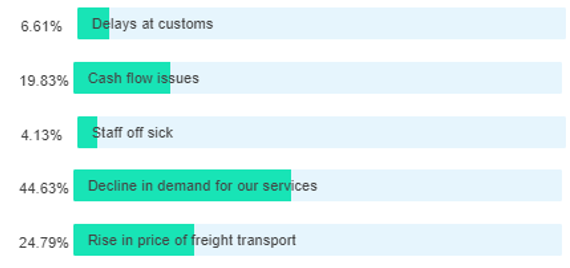Coronavirus continues to impact global trade but businesses and supply chains are adapting, delegates at an Institute of Export & International Trade (IOE&IT) webinar heard yesterday.
Kevin Shakespeare, director of stakeholder engagement, was speaking on an IOE&IT ‘Open to Export’ webinar, updating an audience of 300 UK traders on measures to mitigate the impact of the virus.
Below are four key learnings from the webinar.
1. Look to UK deal with Ireland and France
Mr Shakespeare said that “supply chains must keep moving” and cited a deal struck by the UK government with France and the Republic of Ireland that will keep several key trade routes open between those countries.
He said it was “imperative” UK businesses maintain “supplier and customer communications”, especially as European nations begin to emerge from lockdown.
2. Freight delivery delays
Goods – including non-essentials – continue to be moved internationally, but there are delays.
Freight prices are fluctuating, while some forwarders and shipping lines are providing warehouse capacity for undelivered goods, said Mr Shakespeare.
Nearly two-thirds (60%) of delegates polled during the webinar said they had experienced delays, but they were still managing to dispatch or receive components or goods.
More than a third (39%) said they were not experiencing delays while below 1% said they weren’t able to send or receive goods or components at all.
3. Don’t forget Brexit
Mr Shakespeare stressed that businesses should continue to prepare for the end of the Brexit transition period as scheduled in December 2020.
He cited several key announcements on the future of UK-EU trade that have been made during the lockdown period, including:
- Applications for customs authorisations will become easier and faster
- A parent company in the UK will be able to make customs declarations on behalf of a group (subsidiary) of companies
- Some UK companies will no longer be able to use their UK AEO (Authorised Economic Operator) status for ‘Permanent Business Establishments’ or branches in the EU (such as warehouses, packing operations and sales offices)
4. Decline in demand
Almost of half (45%) of the webinar’s attendees said a decline in demand for services was the biggest impact of coronavirus on their business.
This was followed by increased prices of freight (25%) and cash flow issues (20%).
When asked if they had managed to access funds from the government’s financial support schemes during the pandemic, a third (36%) said they had, with only 12% saying they had tried but not gained access.
Next webinar
If you trade overseas online, then the next Open to Export webinar is a must-attend. Held on Thursday, 21 May at 2pm in partnership with Clickthrough Marketing and The Translation People, ‘Reaching overseas customers online’ will cover:
- Optimising your website for international markets
- Reaching customers on ecommerce and social media platforms
- How to ensure your messaging is right in each market
- The importance of proper translation






